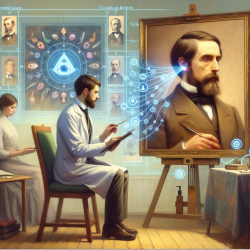In the evolving field of speech-language pathology, continuous professional development is essential for achieving the best outcomes for children. By examining historical research, such as the work of Sir James Crichton-Browne, practitioners can gain valuable insights that inform their practice today. The research article titled "What the doctor thought and did: Sir James Crichton-Browne (1840-1938)" provides a compelling look into the methods and thoughts of a pioneering figure in medical history.
Historical Context and Its Relevance
Sir James Crichton-Browne was a renowned British psychiatrist whose work spanned the late 19th and early 20th centuries. His innovative approaches to mental health and neurological disorders offer lessons that remain relevant for contemporary practitioners. Crichton-Browne's meticulous documentation and observational skills set a high standard for medical research and practice.
Key Takeaways for Modern Practitioners
Drawing from Crichton-Browne's research, here are some actionable insights for today's speech-language pathologists:
- Meticulous Observation: Crichton-Browne emphasized the importance of detailed observation in diagnosing and treating patients. Modern practitioners can benefit from honing their observational skills to identify subtle cues in children's speech and language development.
- Holistic Approach: Crichton-Browne believed in treating the whole person rather than just the symptoms. This holistic approach is crucial in speech-language pathology, where emotional and social factors often play a significant role in a child's progress.
- Interdisciplinary Collaboration: Crichton-Browne's work highlighted the value of collaborating with other medical professionals. Speech-language pathologists can enhance their practice by working closely with educators, psychologists, and other healthcare providers.
- Data-Driven Decisions: Like Crichton-Browne, modern practitioners should rely on data and evidence-based practices to guide their interventions. Keeping detailed records and using data analytics can lead to more effective therapy outcomes.
Encouraging Further Research
The work of Sir James Crichton-Browne serves as a reminder of the importance of ongoing research in the field of speech-language pathology. Practitioners are encouraged to engage in their own research projects or collaborate with academic institutions to explore new methods and interventions. By contributing to the body of knowledge, practitioners can help advance the field and improve outcomes for children.
Conclusion
The historical insights provided by Sir James Crichton-Browne's work offer valuable lessons for modern speech-language pathologists. By implementing meticulous observation, adopting a holistic approach, collaborating across disciplines, and making data-driven decisions, practitioners can enhance their skills and create better outcomes for the children they serve.To read the original research paper, please follow this link:
What the doctor thought and did: Sir James Crichton-Browne (1840-1938).










